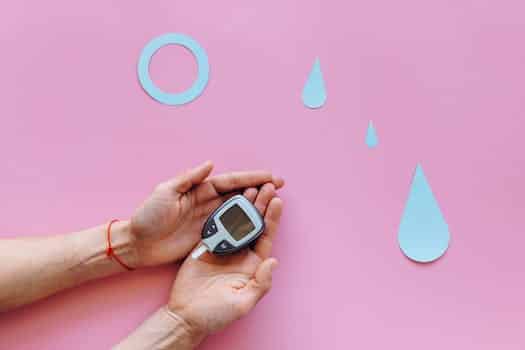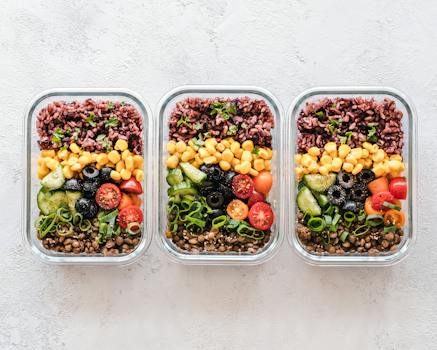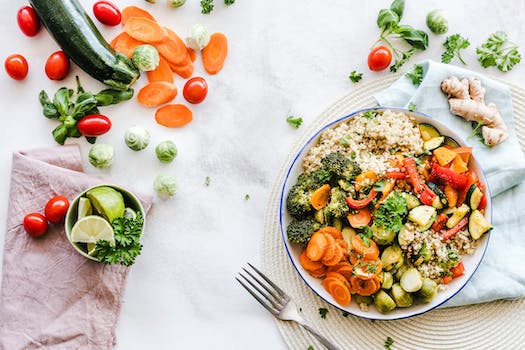
A healthy diet plays a crucial role in maintaining not just our overall well-being but also the health of our skin. In this ultimate guide, we will explore the key elements of a healthy diet plan that can promote healthy and glowing skin. From incorporating nutrient-rich foods to understanding the importance of hydration, this guide will provide you with valuable insights and practical tips to achieve and maintain a radiant complexion. So, let’s dive into the world of nutrition and discover how to nourish our skin from within!
- 1. Introduction
- 1.1. Understanding the connection between diet and skin health
- 1.2. The importance of a healthy diet for glowing skin
- 1.3. Common skin issues caused by poor dietary choices
- 1.4. Benefits of following a healthy diet for your skin
- 1.5. How to create a healthy diet plan for your skin
- 2. Key Nutrients for Healthy Skin
- 2.1. Vitamins for skin health
- 2.2. Essential minerals for glowing skin
- 2.3. Antioxidants and their role in maintaining skin health
- 2.4. Omega-3 fatty acids for nourished skin
- 2.5. Hydration and its impact on skin
- 3. Foods for Healthy Skin
1. Introduction
Maintaining a healthy diet is crucial for achieving and maintaining healthy skin. The food we consume plays a significant role in the overall health of our skin. A well-balanced diet not only nourishes our body but also provides essential nutrients that promote skin health. This ultimate guide aims to provide you with valuable insights and tips on following a healthy diet plan to achieve radiant and glowing skin.
1.1. Understanding the connection between diet and skin health
The connection between diet and skin health is a topic that has gained significant attention in recent years. It is now widely recognized that what we eat not only affects our overall health but also has a direct impact on the appearance and condition of our skin. Research has shown that certain nutrients and dietary patterns can promote healthy skin, while others can contribute to various skin issues.
In this guide, we will explore the relationship between diet and skin health in depth. We will discuss how specific nutrients, such as vitamins, minerals, and antioxidants, play a crucial role in maintaining the health and vitality of our skin. Additionally, we will examine how certain foods and dietary habits can either support or harm our skin.
By understanding the connection between diet and skin health, you will be able to make informed choices about what you eat and develop a healthy diet plan that promotes radiant, glowing skin. So, let’s dive into this ultimate guide to a healthy diet plan for healthy skin!
1.2. The importance of a healthy diet for glowing skin
A healthy diet plays a crucial role in maintaining the health of our skin. Our skin is the largest organ of our body and acts as a protective barrier against external elements. It is constantly exposed to pollution, UV rays, and other harmful substances that can damage its health and appearance. By providing our skin with the right nutrients, we can promote its overall health, prevent various skin conditions, and achieve a natural glow.
A healthy diet consists of consuming a variety of nutrient-rich foods that are beneficial for our skin. These include fruits, vegetables, whole grains, lean proteins, and healthy fats. Each of these food groups provides specific vitamins, minerals, and antioxidants that contribute to the health and vitality of our skin.
In this article, we will explore the importance of a healthy diet for glowing skin and discuss the various nutrients that are essential for maintaining healthy skin. We will also provide practical tips and guidelines for incorporating these nutrients into our daily diet plan.
1.3. Common skin issues caused by poor dietary choices
Poor dietary choices can have a significant impact on the health of our skin. Our skin is a reflection of our overall health, and what we eat plays a crucial role in maintaining its youthful and radiant appearance. In this section, we will explore some common skin issues that can be caused by making poor dietary choices. By understanding these issues, we can make smarter food choices to promote healthier skin. Let’s dive in!
1.4. Benefits of following a healthy diet for your skin
Maintaining a healthy diet not only benefits your overall well-being but also plays a significant role in maintaining healthy skin. Your skin is the largest organ of your body and requires proper nourishment to stay radiant and youthful. By following a healthy diet plan, you can enhance the health and appearance of your skin in numerous ways.
1.5. How to create a healthy diet plan for your skin
A healthy diet plays a crucial role in maintaining the health and appearance of our skin. The food we consume directly affects the condition of our skin, and by making mindful choices, we can create a diet plan that promotes healthy and glowing skin. In this guide, we will explore various aspects of creating a healthy diet plan specifically for improving the health of our skin. From understanding the importance of hydration to incorporating nutrient-rich foods, we will provide valuable insights and tips to help you achieve a radiant complexion. So, let’s dive into the ultimate guide to a healthy diet plan for healthy skin!
2. Key Nutrients for Healthy Skin
Maintaining healthy skin involves more than just using skincare products. It starts from within, with a well-balanced diet that provides all the essential nutrients for skin health. Here are some key nutrients that are important for maintaining healthy skin:
1. Vitamin C: This powerful antioxidant helps in the production of collagen, which keeps the skin firm and supple. It also helps protect the skin from damage caused by free radicals.
2. Vitamin E: Another antioxidant, vitamin E helps in repairing and protecting the skin from damage. It also moisturizes the skin and reduces inflammation.
3. Omega-3 Fatty Acids: These healthy fats help keep the skin hydrated and reduce inflammation. They can be found in fatty fish like salmon, chia seeds, and walnuts.
4. Zinc: Zinc plays a crucial role in regulating oil production in the skin, preventing acne and promoting wound healing. It can be found in foods like oysters, beef, and pumpkin seeds.
5. Selenium: This mineral helps protect the skin from damage caused by the sun and environmental pollutants. It can be found in Brazil nuts, seafood, and whole grains.
6. Beta-Carotene: Found in orange and yellow fruits and vegetables, beta-carotene is converted into vitamin A in the body. It helps in repairing skin tissues and promotes a healthy complexion.
Including these key nutrients in your diet can help promote healthy skin and prevent various skin problems. Remember to also stay hydrated, avoid excessive sun exposure, and follow a regular skincare routine for optimal results.
2.1. Vitamins for skin health
Vitamins play a crucial role in maintaining the health and appearance of our skin. They provide essential nutrients that promote skin repair, protect against damage, and enhance its overall glow. Incorporating the right vitamins into your diet can help you achieve a healthy and radiant complexion.
One key nutrient for healthy skin is Vitamin C. This powerful antioxidant helps to neutralize free radicals, which can cause skin aging and damage. It also plays a vital role in collagen synthesis, a protein that keeps your skin firm and elastic. Citrus fruits, strawberries, kiwi, and bell peppers are excellent sources of Vitamin C.
Another important vitamin for skin health is Vitamin E. It acts as a natural moisturizer, keeping your skin hydrated and preventing dryness. Vitamin E also protects against oxidative stress and UV damage. You can find Vitamin E in foods like nuts, seeds, spinach, and avocados.
Vitamin A is another essential nutrient that supports healthy skin. It promotes cell turnover, helping to maintain a smooth and youthful complexion. This vitamin is commonly found in foods like sweet potatoes, carrots, kale, and liver.
In addition to these vitamins, B-complex vitamins such as Biotin (Vitamin B7) and Niacin (Vitamin B3) are essential for maintaining healthy skin. Biotin helps to strengthen the skin’s protective barrier, while Niacin improves skin elasticity and reduces redness. Foods rich in B-complex vitamins include eggs, legumes, whole grains, and leafy greens.
To ensure optimal skin health, it’s important to incorporate a variety of foods rich in these key vitamins into your diet. Remember to consult with a healthcare professional or a registered dietitian for personalized advice on the best sources and amounts of vitamins for your specific needs.
2.2. Essential minerals for glowing skin
Essential minerals play a crucial role in maintaining glowing and healthy skin. These minerals provide the necessary nourishment that our skin needs to stay radiant and youthful. Here are some key minerals that are essential for achieving that enviable glow:
1. Zinc: Zinc is known for its powerful healing properties and can help in reducing inflammation and preventing acne. It also aids in collagen production, which promotes skin elasticity and reduces the appearance of fine lines and wrinkles.
2. Selenium: Selenium acts as a potent antioxidant and protects the skin from damage caused by free radicals. It also helps in maintaining the skin’s elasticity and firmness.
3. Copper: Copper is essential for the production of melanin, which gives color to the skin. It also plays a vital role in collagen synthesis, promoting skin elasticity and reducing the signs of aging.
4. Magnesium: Magnesium helps in maintaining a healthy skin barrier and prevents moisture loss. It also aids in skin cell regeneration and repair, leading to a smoother and more radiant complexion.
5. Iron: Iron is necessary for oxygen transportation to the skin cells, which is crucial for maintaining skin health and radiance. It also helps in the production of collagen, promoting skin elasticity.
Including these essential minerals in your diet can have a significant impact on the overall health and appearance of your skin. Make sure to incorporate mineral-rich foods like nuts, seeds, legumes, leafy greens, and whole grains into your daily meals to nourish your skin from within.
2.3. Antioxidants and their role in maintaining skin health
Antioxidants play a crucial role in maintaining skin health. These powerful compounds help protect the skin from damage caused by harmful free radicals. Free radicals are unstable molecules that can cause oxidative stress, leading to premature aging and other skin issues.
By neutralizing free radicals, antioxidants help to reduce inflammation and promote a youthful complexion. They also aid in the repair of damaged skin cells and support the production of collagen, a protein that keeps the skin firm and elastic.
Some of the key antioxidants for healthy skin include vitamins A, C, and E, as well as selenium and zinc. Vitamin A helps to regulate the production of skin cells and promotes their healthy turnover. Vitamin C boosts collagen production and brightens the skin. Vitamin E protects against sun damage and moisturizes the skin.
Selenium is a mineral that acts as an antioxidant, protecting the skin from UV radiation and reducing inflammation. Zinc helps to regulate oil production, prevent acne, and support the healing of damaged skin.
Incorporating foods rich in antioxidants into your diet can significantly improve the health and appearance of your skin. Fruits and vegetables like berries, citrus fruits, leafy greens, and bell peppers are excellent sources of antioxidants. Other sources include nuts, seeds, whole grains, and seafood.
To ensure you’re getting enough antioxidants, consider adding supplements to your daily routine. However, it’s always best to consult with a healthcare professional before starting any new supplement regimen.
In conclusion, antioxidants are essential for maintaining healthy skin. By incorporating antioxidant-rich foods and supplements into your diet, you can support your skin’s natural defenses and achieve a radiant and youthful complexion.
2.4. Omega-3 fatty acids for nourished skin
Omega-3 fatty acids play a crucial role in maintaining nourished and healthy skin. These essential fatty acids are known for their anti-inflammatory properties, which can help reduce skin redness, swelling, and irritation. Additionally, omega-3s help to moisturize the skin from within, keeping it hydrated and supple.
Moreover, these fatty acids support the production of collagen, a protein that gives the skin its structure and elasticity. By promoting collagen synthesis, omega-3s can help reduce the appearance of wrinkles and fine lines, giving the skin a youthful and radiant look.
Incorporating foods rich in omega-3 fatty acids into your diet is essential for the overall health and appearance of your skin. Some excellent sources of omega-3s include fatty fish like salmon, mackerel, and sardines, as well as flaxseeds, chia seeds, and walnuts.
By ensuring an adequate intake of omega-3 fatty acids, you can nourish your skin from the inside out and maintain a healthy and vibrant complexion.
2.5. Hydration and its impact on skin
Hydration plays a vital role in maintaining healthy skin. The impact of proper hydration on the skin cannot be overstated. When the body is well-hydrated, the skin appears plump, radiant, and youthful. On the other hand, dehydration can lead to dryness, dullness, and even premature aging of the skin.
Water is the most important nutrient for skin hydration. It helps to moisturize the skin from within and keeps it soft and supple. Drinking an adequate amount of water throughout the day is crucial for maintaining optimal skin health.
In addition to water, other key nutrients also contribute to skin hydration. These include vitamins, minerals, and fatty acids. Vitamin E, for example, is known for its ability to moisturize and nourish the skin. Omega-3 fatty acids are essential for maintaining the skin’s natural barrier function, preventing moisture loss.
To ensure proper hydration and overall skin health, it is important to incorporate foods rich in these key nutrients into your diet. Foods like fruits, vegetables, whole grains, nuts, and seeds are excellent sources of vitamins, minerals, and healthy fats that promote hydration and nourishment of the skin.
In conclusion, staying hydrated is essential for maintaining healthy skin. By incorporating key nutrients into your diet, you can enhance the hydration levels of your skin, leading to a more youthful and vibrant complexion.
3. Foods for Healthy Skin
Your diet plays a crucial role in maintaining the health and appearance of your skin. Including certain foods in your daily meals can help nourish your skin from within and promote a clear complexion. Here are some top foods for healthy skin:
1. Fatty Fish: Fish like salmon, mackerel, and sardines are rich in omega-3 fatty acids, which help keep the skin moisturized and supple. Omega-3s also reduce inflammation and protect against sun damage.
2. Avocados: Packed with healthy fats and antioxidants, avocados promote skin elasticity and hydration. They also contain vitamins C and E, which protect the skin from oxidative damage.
3. Walnuts: These nuts are a great source of essential fatty acids, zinc, vitamin E, and selenium. They help maintain skin health, improve collagen production, and protect against UV damage.
4. Sweet Potatoes: Rich in beta-carotene, sweet potatoes are converted into vitamin A in the body. Vitamin A is essential for skin cell turnover, promoting a healthy glow.
5. Spinach: Loaded with nutrients like vitamins A, C, and E, spinach helps repair and rejuvenate the skin. It also contains antioxidants that fight free radicals and protect against skin aging.
Including these foods in your diet can contribute to healthier, radiant skin. Remember to also drink plenty of water, exercise regularly, and maintain a consistent skincare routine for optimal results.
3.1. Incorporating fruits and vegetables into your diet
Incorporating fruits and vegetables into your diet is essential for achieving and maintaining healthy skin. These natural and nutrient-rich foods can provide your skin with the necessary vitamins, minerals, and antioxidants it needs to stay vibrant and glowing.
Fruits and vegetables are packed with antioxidants, which help protect your skin from damage caused by free radicals. Free radicals can lead to premature aging, wrinkles, and other skin problems. By consuming a variety of colorful fruits and vegetables, you can boost your antioxidant intake and promote youthful-looking skin.
Additionally, fruits and vegetables are rich in vitamins and minerals that are crucial for skin health. For example, vitamin C found in citrus fruits can help promote collagen production, which is essential for maintaining skin elasticity. Vitamin A, commonly found in carrots and sweet potatoes, can help repair damaged skin cells and promote a healthy complexion.
Including a wide range of fruits and vegetables in your diet can also provide hydration to your skin. Many fruits and vegetables have a high water content, which can help keep your skin moisturized and prevent dryness. Proper hydration is essential for maintaining healthy skin and reducing the appearance of fine lines and wrinkles.
To incorporate more fruits and vegetables into your diet, try adding them to your meals or snacks. You can have a colorful salad with a variety of greens, tomatoes, bell peppers, and berries. Smoothies made with fruits and leafy greens are also a great way to get a nutrient-packed boost.
In conclusion, incorporating fruits and vegetables into your diet is essential for achieving healthy skin. These foods provide valuable nutrients, antioxidants, and hydration that can improve the overall appearance and vitality of your skin.
3.2. The importance of lean proteins for skin health
Lean proteins play a crucial role in maintaining healthy skin. They provide the necessary building blocks for collagen production, which is essential for keeping the skin firm and elastic. Collagen helps to prevent wrinkles and fine lines, giving the skin a youthful appearance.
In addition, lean proteins contain amino acids that aid in repairing and renewing skin cells. These amino acids help to heal any damage to the skin and promote a faster turnover of new, healthy cells.
Furthermore, lean proteins have a low glycemic index, which means they do not cause a spike in blood sugar levels. High blood sugar levels can lead to inflammation, which can contribute to skin problems such as acne and eczema. By incorporating lean proteins into your diet, you can help keep your blood sugar levels stable and reduce the risk of skin issues.
Some excellent sources of lean proteins include skinless chicken breast, turkey, fish, tofu, beans, lentils, and low-fat dairy products. These foods are not only rich in protein but also provide other essential nutrients for overall skin health.
To optimize the benefits of lean proteins for your skin, it is important to choose lean cuts of meat and prepare them in a healthy way, such as grilling or baking instead of frying. Additionally, incorporating a variety of lean proteins into your diet can ensure that you are getting a wide range of nutrients that are beneficial for your skin.
3.3. Healthy fats and their contribution to skin radiance
Healthy fats play a crucial role in maintaining skin radiance. These fats are essential for nourishing the skin from within and keeping it smooth, supple, and glowing. They help in the absorption of vital vitamins and minerals, promoting overall skin health.
Omega-3 fatty acids, found in fatty fish like salmon and mackerel, as well as in walnuts and flaxseeds, are known for their anti-inflammatory properties. They help reduce skin redness and irritation, making the complexion appear more even and youthful.
Monounsaturated fats, such as those found in avocados, olive oil, and nuts, provide moisture to the skin and help in maintaining its elasticity. They also support the production of collagen, a protein responsible for skin strength and firmness.
Another healthy fat, known as polyunsaturated fat, is found in sunflower seeds, soybeans, and fatty fish. These fats are rich in essential fatty acids that act as building blocks for healthy cell membranes. They help in retaining moisture and preventing dryness, resulting in a hydrated and glowing complexion.
Incorporating these healthy fats into your diet can have a significant impact on your skin’s appearance. Including a variety of fatty fish, nuts, seeds, and oils in your meals ensures a good intake of these beneficial fats, contributing to vibrant and healthy skin.
3.4. Whole grains and their benefits for skin
Whole grains are not only beneficial for overall health, but they also have numerous advantages for the skin. These grains are rich in vitamins, minerals, and antioxidants that promote healthy skin. The high fiber content in whole grains helps in regulating digestion, which in turn contributes to clear and glowing skin. Additionally, whole grains contain essential fatty acids that help maintain the skin’s natural moisture balance, preventing dryness and promoting a youthful appearance. The antioxidants present in whole grains also protect the skin from damage caused by free radicals, reducing the signs of aging. Including whole grains such as oats, brown rice, quinoa, and whole wheat in your diet can greatly improve the health and appearance of your skin.
3.5. Superfoods for a glowing complexion
Superfoods for a glowing complexion
When it comes to achieving a healthy and radiant complexion, incorporating superfoods into your diet can work wonders. These nutrient-dense foods are packed with essential vitamins, minerals, and antioxidants that promote skin health and give you that coveted glow. Here are some superfoods that can help improve your skin’s appearance:
1. Avocado: Known for its high levels of healthy fats, avocados hydrate the skin and keep it supple, reducing the appearance of fine lines and wrinkles.
2. Blueberries: Rich in antioxidants, blueberries protect the skin from damage caused by free radicals and help maintain its youthful elasticity.
3. Spinach: This leafy green is a powerhouse of nutrients, including vitamins A, C, and E, which help repair and rejuvenate the skin.
4. Salmon: Packed with omega-3 fatty acids, salmon helps reduce inflammation and keeps the skin moisturized, resulting in a smoother and healthier complexion.
5. Green tea: Known for its detoxifying properties, green tea flushes out toxins from the body, which can improve the clarity and brightness of the skin.
Including these superfoods in your diet can go a long way in achieving a glowing complexion. Remember to also drink plenty of water, get enough sleep, and follow a consistent skincare routine for optimal results.
Conclusion
In conclusion, adopting a healthy diet plan is crucial for maintaining healthy skin. By incorporating a variety of nutrient-rich foods, such as fruits, vegetables, whole grains, lean proteins, and healthy fats, you can nourish your skin from the inside out. Remember to stay hydrated, limit processed foods and sugary drinks, and listen to your body’s unique needs. By making these dietary changes, you can achieve radiant and glowing skin that reflects your overall health and well-being.


